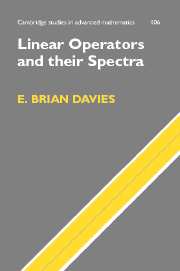Book contents
- Frontmatter
- Contents
- Preface
- 1 Elementary operator theory
- 2 Function spaces
- 3 Fourier transforms and bases
- 4 Intermediate operator theory
- 5 Operators on Hilbert space
- 6 One-parameter semigroups
- 7 Special classes of semigroup
- 8 Resolvents and generators
- 9 Quantitative bounds on operators
- 10 Quantitative bounds on semigroups
- 11 Perturbation theory
- 12 Markov chains and graphs
- 13 Positive semigroups
- 14 NSA Schrödinger operators
- References
- Index
Preface
Published online by Cambridge University Press: 08 January 2010
- Frontmatter
- Contents
- Preface
- 1 Elementary operator theory
- 2 Function spaces
- 3 Fourier transforms and bases
- 4 Intermediate operator theory
- 5 Operators on Hilbert space
- 6 One-parameter semigroups
- 7 Special classes of semigroup
- 8 Resolvents and generators
- 9 Quantitative bounds on operators
- 10 Quantitative bounds on semigroups
- 11 Perturbation theory
- 12 Markov chains and graphs
- 13 Positive semigroups
- 14 NSA Schrödinger operators
- References
- Index
Summary
This volume is halfway between being a textbook and a monograph. It describes a wide variety of ideas, some classical and others at the cutting edge of current research. Because it is directed at graduate students and young researchers, it often provides the simplest version of a theorem rather than the deepest one. It contains a variety of examples and problems that might be used in lecture courses on the subject.
It is frequently said that over the last few decades there has been a decisive shift in mathematics from the linear to the non-linear. Even if this is the case it is easy to justify writing a book on the theory of linear operators. The range of applications of the subject continues to grow rapidly, and young researchers need to have an accessible account of its main lines of development, together with references to further sources for more detailed reading.
Probability theory and quantum theory are two absolutely fundamental fields of science. In terms of their technological impact they have been far more important than Einstein's relativity theory. Both are entirely linear. In the first case this is in the nature of the subject. Many sustained attempts have been made to introduce non-linearities into quantum theory, but none has yet been successful, while the linear theory has gone from triumph to triumph. Nobody can predict what the future will hold, but it seems likely that quantum theory will be used for a long time yet, even if a non-linear successor is found.
The fundamental equations of quantum mechanics involve self-adjoint and unitary operators. However, once one comes to applications, the situation changes.
Information
- Type
- Chapter
- Information
- Linear Operators and their Spectra , pp. ix - xiiPublisher: Cambridge University PressPrint publication year: 2007
